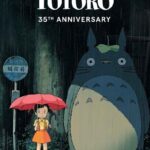Spirited Away: On a warm afternoon, ten-year-old Chihiro Ogino and her parents drive toward their new home. Chihiro, sulking in the back seat, feels miserable about leaving her old life behind. But when they take a wrong turn and stumble upon what seems to be an abandoned amusement park, her life takes a turn into a world beyond imagination.
Spirited Away is not just a film—it is an enchanting journey into the unknown, a story of courage, self-discovery, and the magic hidden within the ordinary.

Movie Details
| Title | Spirited Away (Sen to Chihiro no Kamikakushi) |
|---|---|
| Director | Hayao Miyazaki |
| Studio | Studio Ghibli |
| Release Date | July 20, 2001 (Japan) |
| Runtime | 125 minutes |
| Genre | Fantasy, Adventure, Supernatural |
| Language | Japanese (with multiple dubbed versions) |
| IMDb Rating | 8.6/10 |
| Number of Reviews | Over 900,000 user reviews |
| IMDb Link | IMDb Page |
A Mysterious World
Curious about the strange place, Chihiro’s parents explore the deserted park and come across a food stall filled with delicious dishes. Without hesitation, they begin eating, unaware that they have just broken an unspoken rule of this hidden world.
As Chihiro wanders deeper into the town, the sun sets, and the once-empty streets come to life with spirits and strange creatures. Terrified, she rushes back to her parents—only to find that they have been transformed into giant pigs.
Alone and frightened, Chihiro soon realizes that she has entered the spirit realm, a place ruled by magic and ancient beings. A mysterious boy named Haku appears and warns her that she must leave before she, too, is trapped forever. But the entrance has vanished, and Chihiro is stuck in a world she does not understand.
Surviving in the Bathhouse
Haku tells Chihiro that the only way to survive in this world is to find work. He takes her to a massive bathhouse run by the powerful witch Yubaba, who controls the spirits and keeps humans as servants.
Trembling, Chihiro begs for a job. Yubaba, though reluctant, agrees but takes away Chihiro’s real name, renaming her Sen. Haku warns her that if she forgets her true name, she will never be able to return to the human world.
With no choice, Sen begins working in the bathhouse, facing cruel co-workers, strange customers, and a world where nothing is what it seems. But despite her fear, she starts to grow stronger. She befriends Lin, a tough but kind worker, and gains the trust of Kamaji, the six-armed boiler man who controls the bathhouse’s water supply.
But danger lurks everywhere.
The Mysterious No-Face
One night, Sen unknowingly lets a lonely spirit called No-Face into the bathhouse. At first, No-Face seems harmless, offering gold and granting wishes. But as greed consumes the workers, it begins to devour them, growing larger and more monstrous.
Realizing her mistake, Sen refuses No-Face’s gifts, and with quick thinking, she lures it outside, where it finally calms down. Unlike others, Sen shows kindness not for rewards but because it is the right thing to do.
Meanwhile, Sen learns that Haku is in grave danger. He has stolen a magic seal from Yubaba’s twin sister, Zeniba, and is now cursed. Sen, determined to save him, embarks on a journey to return the stolen seal and break the curse.
A Journey to Zeniba
With No-Face as her companion, Sen travels to Zeniba’s cottage. Unlike her twin, Zeniba is kind and welcomes her with warmth. She tells Sen that Haku can only be saved if he remembers his true self.
As Sen prepares to leave, Zeniba gives her a small hairband as a gift, woven with magic for protection. Sen, now more confident than ever, returns to the bathhouse to save Haku.
Breaking the Curse
As she rushes back, Sen recalls something buried deep in her memory—a childhood moment when she once fell into a river and was saved by an unseen force. She realizes that Haku is the spirit of that very river, the Kohaku River.
By remembering his name, she frees him from Yubaba’s control. The spell is broken, and Haku, now himself again, smiles for the first time.
But Sen’s journey is not over. Yubaba challenges her to a final test—if she can identify her parents among a group of pigs, they will be set free.
Sen looks carefully and confidently answers: “None of these are my parents.”
With that, the spell shatters. The way home is open.
A Farewell and a Promise
Haku walks Sen to the tunnel where her journey began. He promises they will meet again, but she must not look back as she leaves. Holding back tears, Sen steps forward, returning to the human world.
On the other side, she finds her parents, unchanged, unaware of what has happened. As they walk back to their car, Sen glances back one last time—but the magical world is gone.
Her adventure is over, but she is no longer the timid girl who first entered the spirit world. She is stronger, braver, and ready to face whatever comes next.
What This Movie Teaches Us
Spirited Away is a story of courage, kindness, and identity. It teaches us that even in the strangest places, we can find strength within ourselves. Chihiro starts as a scared, whiny child but grows into someone brave and compassionate.
The movie also reminds us of the dangers of greed and selfishness. Chihiro’s parents are transformed into pigs because they take what is not theirs, and the bathhouse workers fall for No-Face’s gold, only to be swallowed by their own greed.
But most of all, Spirited Away teaches us that growing up is about learning, facing fears, and never forgetting who we are.
Why You Should Watch It
With breathtaking animation, unforgettable characters, and a story rich with meaning, Spirited Away is more than just a fantasy film—it is a masterpiece.
The movie’s world feels alive, from the towering bathhouse to the mysterious spirits. Each scene is filled with detail and emotion, making it a movie you can watch over and over again, always discovering something new.
If you have never seen Spirited Away, you are in for an unforgettable journey.
FAQ – Spirited Away
1. What is Spirited Away about?
It is the story of a young girl, Chihiro, who becomes trapped in the spirit world and must find the strength to save her parents and return home.
2. Is Spirited Away based on a real myth?
While it is not based on one specific legend, it draws inspiration from Japanese folklore and Shinto beliefs about spirits.
3. What does No-Face represent?
No-Face represents loneliness, desire, and the impact of one’s environment. When treated with greed, it becomes monstrous, but when shown kindness, it calms down.
4. Why did Haku forget his name?
Yubaba took his name to control him, just as she did with Chihiro. When Chihiro remembers his real name, he is freed.
5. What is the meaning of the ending?
The ending symbolizes growth and change. Chihiro has learned valuable lessons, but her journey is hers alone—she cannot bring back proof, only memories.







